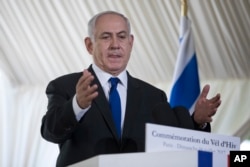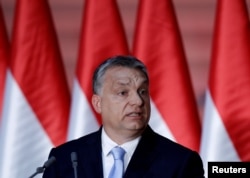The first visit by an Israeli prime minister to Hungary since 1989 finds Benjamin Netanyahu at odds with the country's main Jewish group over Israel's failure to fully condemn a campaign by the Hungarian government against billionaire philanthropist George Soros.
Netynyahu, who arrived in Budapest on Monday, will be meeting with Hungarian counterpart Viktor Orban on Tuesday and with leaders of the other Central European countries in the Visegrad Group — Poland, the Czech Republic and Slovakia — on Wednesday.
However, it's his encounter late Wednesday with leaders of Hungary's Jewish community that may be most tricky.
Andras Heisler, president of the Federation of Hungarian Jewish Communities, told The Associated Press that he had recently asked the Israeli government to explain to his group why Israel shifted its position on the Orban government's ads targeting George Soros, whom Orban — radically opposed to migration — largely blames for Europe's migrant crisis.
While the campaign officially ended on Saturday, many billboards with a photo of a smiling Soros and the caption “Let's not allow Soros to have the last laugh” were still visible around Budapest.
On July 8 the Israeli ambassador to Hungary called for an end to the anti-Soros billboards and posters, but a day later the Israeli foreign ministry issued a “clarification”’ noting that while it deplored “any expression of anti-Semitism,” it did not seek to “delegitimize” criticism of Soros, a Budapest-born Holocaust survivor, accusing him of “continuously undermining” Israel's governments.
Soros supports groups that Israel's hawkish government views as unfairly harsh toward the Jewish state or favoring Palestinian viewpoints.
“The Israeli foreign ministry's clarification ... in part surprised us and in part was hugely disappointing,” Andras Heisler, president of the Federation of Hungarian Jewish Communities, told The Associated Press. “The Hungarian Jewish community felt that we were left in the lurch.”
Heisler noted the Orban government's support for Hungary's Jewish community in projects like the renovation of synagogues and its political backing of Israel in international forums.
“On the other hand, in terms of remembrance policies and historical perspectives, we sometimes have serious conflicts with the Hungarian government,” Heisler said.
Orban's praise for Miklos Horthy, Hungary's post-World War I leader, has drawn criticism from Jewish groups, and the 2014 unveiling of a statue commemorating Nazi Germany's 1944 invasion of Hungary, its hitherto ally, was seen by critics as an effort to downplay Hungary's role in the Holocaust, in which some 550,000 Hungarian Jews were killed.
Still, Netanyahu's visit to Hungary, which will also include a business forum, could be aimed at seeking support among regional European Union members for opposition to the so-called BDS movement — boycott, divestment, sanctions — protesting Israel's policies toward Palestinians.
“For Netanyahu, it would be a great political gain if the Visegrad Group rejects BDS while not urging him about peace talks with the Palestinians,” said Gabor Miklos, a former foreign affairs journalist with the daily Nepszabadsag, closed last year after its purchase by an Orban ally. “It would also be a great gain if these countries recognize Jerusalem as Israel's capital.”
For Orban, who professes “zero tolerance for anti-Semitism” despite his conflicts with the Jewish community, hosting Netanyahu could help him mitigate the criticism, Miklos said.
“Netanyahu's visit provides him a kind of acquittal regarding anti-Semitism and the stamp of being far-right,” Miklos said.
Regardless of any differences, Heisler, who said Hungarian Jews face “verbal anti-Semitism'' but not violent attacks like Jewish communities in Western Europe, was looking forward to the Netanyahu meeting.
“For us, the visit of the prime minister of Israel to our country is a very exciting and uplifting occasion,'' Heisler said.






